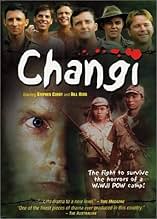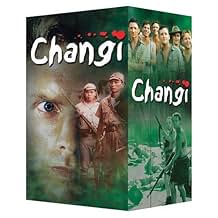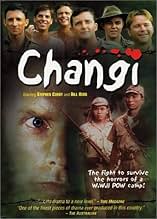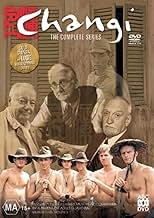Six young men experience pain and horror during their stay in the Japanese Prison Camp during World War II.Six young men experience pain and horror during their stay in the Japanese Prison Camp during World War II.Six young men experience pain and horror during their stay in the Japanese Prison Camp during World War II.
- Awards
- 3 wins & 7 nominations total
Browse episodes
Featured reviews
10leggatt
When I heard there was to be an ABC [Australian Broadcasting Corporation] mini-series based on life in Changi [WWII POW] camp... with a focus on "elements of comedy", I was deeply sceptical and somewhat critical.
My father had served in the second world war. Such was the barbarity of the Japanese, he was able to talk about the horrors in and around Labuan (where he was stationed), until only quite recently. Along with my father, I had been awarded the fortune of knowing many great men (of stronger character and spirit than I shall ever have), who had witnessed acts of unspeakable barbarity at the hands of the Empire of Japan, and had never completely recovered. The name 'Changi' is destined to conjure horrific images for ages to come...
But upon viewing, I was highly impressed with the cast, the characters and the complex plot-lines of this wonderful series. I now regard 'Changi' as the highlight of my week, (bear in mind, I have viewed only three episodes so far... I hope the remaining episodes adhere to the standards set by the first three).
The black humour works uncannily well (however, the flatulence jokes are a little overdone), and while much of the horror has been suppressed, the series comes quite close in relaying the undaunted spirit of the survivors who were able to later continue with their lives in spite of the inhibiting memories.
The 'flashback' format of this series will be difficult for some to follow,
but I can not think of no better way to do adequate justice to the men who suffered deep emotional scarring proceeding internment... when painfully suppressed experiences are remembered, sometimes years after the horror.
One of the darkest chapters of the Second World War, the 20th century, and, (I would go so far as to say), in the history of mankind, is being relayed to a new generation through this series, and I hope it serves to relay the overwhelming adversity borne by the wartime generation.
Proceeding 'Changi', I don't think I shall ever be able to listen to the poignant tune 'on the road to Gundagai' in the same way again. Tune in...
My father had served in the second world war. Such was the barbarity of the Japanese, he was able to talk about the horrors in and around Labuan (where he was stationed), until only quite recently. Along with my father, I had been awarded the fortune of knowing many great men (of stronger character and spirit than I shall ever have), who had witnessed acts of unspeakable barbarity at the hands of the Empire of Japan, and had never completely recovered. The name 'Changi' is destined to conjure horrific images for ages to come...
But upon viewing, I was highly impressed with the cast, the characters and the complex plot-lines of this wonderful series. I now regard 'Changi' as the highlight of my week, (bear in mind, I have viewed only three episodes so far... I hope the remaining episodes adhere to the standards set by the first three).
The black humour works uncannily well (however, the flatulence jokes are a little overdone), and while much of the horror has been suppressed, the series comes quite close in relaying the undaunted spirit of the survivors who were able to later continue with their lives in spite of the inhibiting memories.
The 'flashback' format of this series will be difficult for some to follow,
but I can not think of no better way to do adequate justice to the men who suffered deep emotional scarring proceeding internment... when painfully suppressed experiences are remembered, sometimes years after the horror.
One of the darkest chapters of the Second World War, the 20th century, and, (I would go so far as to say), in the history of mankind, is being relayed to a new generation through this series, and I hope it serves to relay the overwhelming adversity borne by the wartime generation.
Proceeding 'Changi', I don't think I shall ever be able to listen to the poignant tune 'on the road to Gundagai' in the same way again. Tune in...
My family and I enjoy this show and find it a fair thumb nail sketch of what the people went through.
My own father spent some time in Changi before going onto the Thailand-Burma Railway in "F" Force. Much as been said about the treatment the POW's received, I will just say that my father was 6 foot 1 inch and 196 lbs when Singapore fell, at the end of the war he was 5 foot 11 inches tall and 91 lbs.
No show could truly convey what the POW's went through, but this comes closer than most.
As the Ex POW's say, "If you didn't have mates you didn't survive." This show succeeds in getting this message across.
My own father spent some time in Changi before going onto the Thailand-Burma Railway in "F" Force. Much as been said about the treatment the POW's received, I will just say that my father was 6 foot 1 inch and 196 lbs when Singapore fell, at the end of the war he was 5 foot 11 inches tall and 91 lbs.
No show could truly convey what the POW's went through, but this comes closer than most.
As the Ex POW's say, "If you didn't have mates you didn't survive." This show succeeds in getting this message across.
I have an advantage in reading other's comments before making my own. I have heard this "accuracy" comment about other movies/mini-series before and I really don't understand people's statements. Visual stories about historical events are never accurate unless they are documentaries. Beautiful Mind, and Seabiscuit are both examples of movies about true events that were off the mark where telling the whole truth is concerned.
I liked Changi because it showed the effects of war on soldiers both at the time of the event, and on their future lives. I thought the flash backs, both forward and backward, were fine--after all I want to watch a story that makes me use my brain, not just be mindlessly entertained. I thought the humor at times was sophomoric, but weren't most the soldiers in WWII of the age to be sophomoric? I loved the music, and I thought the "Singing Detective" type transition into song was very believable here, as the human mind in times of stress, pain, and torture will use its own devices to preserve sanity--the song sequences could be the writer's depiction of one way the human soul protects itself. How many of you have experienced completely weird dreams while suffering from an illness accompanied by high fever?--this is my point. As to the Japanese captors and the way they were portrayed--the commander here was, in my opinion, a detached person that let his underlings assume all of the responsibility for the horrid treatment of the POWs while the commander fed his bird and listened to music--totally detached, and I think in the end out of touch with reality. As for Lt. Aso, it was plain to see that this character was both bitter and jealous and took this out on his charges. Lt. Aso was bitter that he was not in the thick of the war instead of being stuck at Changi in charge of insulting, spirited, enemy prisoners. He also could not figure out why these enemy soldiers made jokes to laugh at, and sang songs to buoy their spirits.
I also thought the story showed that in a normal situation these six blokes would not have been friends. Their personalities were to varied--from the supremely bright to the un-educated; incredibly brave to perpetually cowering; passively innovative to unbelievably creative. However, under the situation of a POW camp these diverse individuals came together and drew from each other's strengths in order to survive, and in that situation became mates. Rowdy was the father/headmaster figure that the six turned to in times of trouble that was above their expertise. Rowdy also was available to buck them up when their spirits were flagging, and gave them hope that they would survive.
I'm buying this DVD for my WWII collection.
I liked Changi because it showed the effects of war on soldiers both at the time of the event, and on their future lives. I thought the flash backs, both forward and backward, were fine--after all I want to watch a story that makes me use my brain, not just be mindlessly entertained. I thought the humor at times was sophomoric, but weren't most the soldiers in WWII of the age to be sophomoric? I loved the music, and I thought the "Singing Detective" type transition into song was very believable here, as the human mind in times of stress, pain, and torture will use its own devices to preserve sanity--the song sequences could be the writer's depiction of one way the human soul protects itself. How many of you have experienced completely weird dreams while suffering from an illness accompanied by high fever?--this is my point. As to the Japanese captors and the way they were portrayed--the commander here was, in my opinion, a detached person that let his underlings assume all of the responsibility for the horrid treatment of the POWs while the commander fed his bird and listened to music--totally detached, and I think in the end out of touch with reality. As for Lt. Aso, it was plain to see that this character was both bitter and jealous and took this out on his charges. Lt. Aso was bitter that he was not in the thick of the war instead of being stuck at Changi in charge of insulting, spirited, enemy prisoners. He also could not figure out why these enemy soldiers made jokes to laugh at, and sang songs to buoy their spirits.
I also thought the story showed that in a normal situation these six blokes would not have been friends. Their personalities were to varied--from the supremely bright to the un-educated; incredibly brave to perpetually cowering; passively innovative to unbelievably creative. However, under the situation of a POW camp these diverse individuals came together and drew from each other's strengths in order to survive, and in that situation became mates. Rowdy was the father/headmaster figure that the six turned to in times of trouble that was above their expertise. Rowdy also was available to buck them up when their spirits were flagging, and gave them hope that they would survive.
I'm buying this DVD for my WWII collection.
I didnt watch this when it aired thinking it would be boring. I was studying for exams and put the dvd on for background and was shocked. It is a clever piece that inspires all viewers. The acting is first class and production is wonderful. This is one of the greatest aussie dramas ever.
As soon as I saw the ad for "Changi" on the History Channel, I knew I'd love it. It captured the ANZAC spirit fantastically - you would die if you didn't have mates around you. The characters of "Changi" were strong and each brought something different into the story, and the Japanese soldiers weren't criticised, but were depicted as normal soldiers doing what they thought was right, just as the Australians were doing. Direction, screenplay, acting and setting were all done wonderfully, with a clear easy-to-follow plot. Humour was the soldiers' key to survival, and it was great to see a mini-series about war actually have some sort of humour in it, which is usually difficult to do without offending people. From what I've read about soldiers in Changi PoW camp, this story is a very realistic approach to the three and a half years those Australian, British, New Zealand, American and Dutch men spent there. I would recommend this series to anyone, whether you are interested in war or not. 10/10.
Did you know
- TriviaSet dressings were researched from photographs and WWII veterans and obtained from a variety of sources, including the ABC prop store, other Sydney prop houses, private collections, auctions, and second hand stores.
- How many seasons does Changi have?Powered by Alexa
Details
Contribute to this page
Suggest an edit or add missing content


























